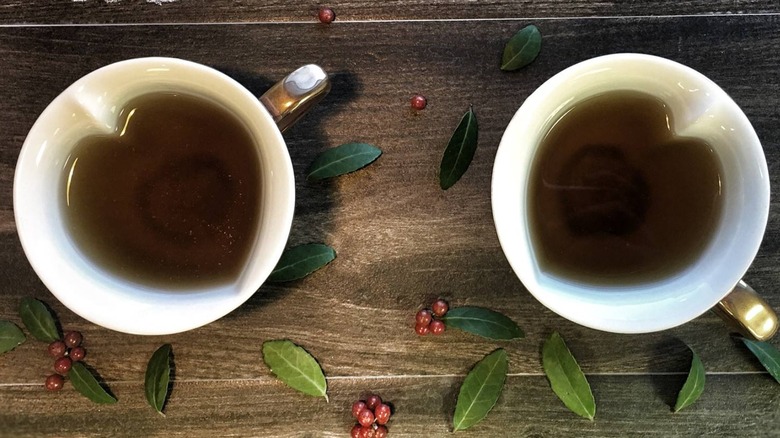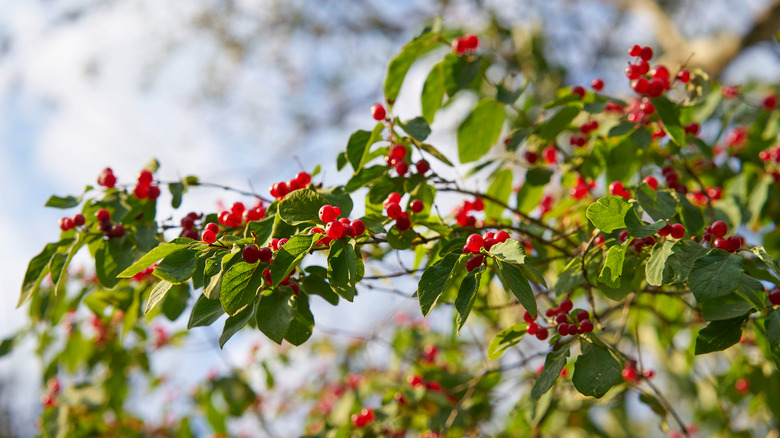The American Tea You Haven't Heard Of But Need To Know About
Many people the world over enjoy brewing a nice cup of tea and sitting down to relax. While it's easy to think of tea as anything steeped in hot water, actual tea is made from the plant camellia sinensis, the leaves of which are used to make caffeinated teas like oolong, white, black, and green teas, according to the North Carolina Extension Gardener Plant Toolbox. Herbal teas aren't true teas, and the Republic of Tea describes these beverages as including the steeping of any roots, barks, flowers, fruits, and leaves of different plants that aren't camellia sinensis.
Yaupon is one such herbal option that still provides some caffeine and is grown right here in the U.S. In fact, yaupon is considered the "North America's only known native caffeinated plant" according to BBC Travel. While not always called yaupon, this tea has storied roots. Dr. William Merrill of the Smithsonian Institution found in research that "almost every Native American tribe" who lived near this plant consumed it, often as a beverage. Describing the history of the tea as fragmented, it is sometimes called North America's "forgotten tea," only recently making a comeback.
A history of Yaupon
Yaupon, pronounced "yo-pawn" according to Texas Monthly, has a long and rich history. Despite being a popular tea native to the American Southeast for generations, it experienced a bit of an image crisis, earning itself the unfortunate name ilex vomitoria from British botanist William Aiton. Whether this name was a genuine misunderstanding of Indigenous rituals or something more politically sinister is up for debate, but either way, the beverage all but disappeared for a time.
Says CatSpring Yaupon co-founder Abianne Falla to Millenial, "My sister started to look into this persistent plant and discovered this legacy of consumption that was long since forgotten! Native Americans consumed and traded it for generations, the Spanish even exported when they arrived but the English didn't want anything to disrupt the power of the tea trade so they downplayed this native resource. With the eradication and forced relocation of most of the Gulf Coast's indigenous people groups, the legacy of this incredible plant was largely destroyed."
And while the plant's legacy may have suffered damage, the yaupon plant itself is very hardy and easy to grow in the right climates, and the plant has been reemerging to the delight of fans. Says Steve Talcott, a food chemistry professor at Texas A&M University to Texas Monthly, "I think the potential is huge. Look at how much the yerba maté market has grown. The challenge is in educating people." As always, awareness is key.
Enjoying a cup of yaupon
Describing the taste of yaupon, Jason Ellis, co-founder of Lost Pines Yaupon, posits that it's "Like green tea and yerba maté had a baby," via Texas Monthly, which concurred, noting that the experience was similar to drinking green tea, "but milder, with delicate herbal notes." Better Homes & Gardens notes that the taste of the tea can vary widely based on the plant's preparation, including "fermenting, oxidizing, drying, [and] roasting." Drinkers can enjoy the beverage hot or cold and add flavorings in the same way as more popular teas and coffees.
One yaupon tea lover on Instagram pointed out the plant's holly-based image with green leaves and bright red berries, noting, "This is Yaupon Black from @harneyteas and uh...it tastes like Christmas? It basically tastes like holly smells. I'm into it, but the best beloved did a double take when he took a sip." Another fan on Twitter shared their favorite blend, writing, "Nothing like a steaming cup of #Yaupon (Ilex vomitoria), mountain mint (Pycnanthemum sp.), & sweet goldenrod (Solidago odora) tea on a chilly day. #YauponTea."
In addition to the pleasant taste and local harvest, yaupon is also known to have some of the same potential health benefits often associated with tea. Healthline shares several such possible improvements, including decreased inflammation, increased energy, and benefits to brain function. Would you try yaupon? As they say, yaupon-ly live once.

